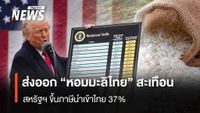In a significant escalation of international trade tensions, the United States has announced a new set of tariffs that will heavily impact Thailand and other nations. On April 2, 2025, President Donald Trump declared the commencement of what he called "Trade War Trump 2.0," introducing a baseline tariff of 10% on all imports from around the globe, effective from April 5, 2025. This move is expected to reshape the landscape of global trade and has raised concerns among Thai exporters about the implications for their businesses.
Thailand faces a staggering reciprocal tariff of 36%, one of the highest rates imposed by the U.S. on any country. This tariff rate is particularly alarming as it exceeds initial expectations and places Thailand in a precarious position compared to its competitors. For instance, Vietnam will face a 46% tariff, while Cambodia and Laos will see rates of 49% and 48%, respectively. The U.S. tariffs are designed to address trade imbalances, with Trump stating that this is a moment to reclaim American industry from foreign competitors who have "stolen" from the U.S.
Mr. Kongkrit Chantaratrakul, a business administration officer, noted that the U.S. tariffs will significantly affect import costs, leading to higher prices for Thai goods in the American market. This price increase is likely to reduce the competitiveness of Thai exports, particularly in sectors where countries like the Philippines and Malaysia face lower tariffs. He stated, "The tariffs will affect our exports, especially in industries where we compete against nations with lower import duties."
In response to these developments, Mr. Thanagorn Kessuwan, a board member of the Thai Transportation Association, expressed concern over the high tariff rates, stating, "The 36% reciprocal tariff from the U.S. is beyond what we anticipated. We need to reassess our strategies to mitigate these impacts." He emphasized the importance of negotiating with the U.S. to promote Thai investments and reduce the trade deficit.
As the situation unfolds, the Thai government is urged to engage in rapid negotiations with U.S. officials to address these tariffs. The Council of Shippers of Thailand (TNSC) has called for immediate discussions with all industry sectors to understand the full extent of the impact. Mr. Thanagorn indicated that the council aims to finalize a comprehensive assessment by May, which could lead to adjustments in the projected growth of Thai exports, initially estimated at a modest increase of 1-3% for 2025.
Another significant concern is the volatility of the Thai currency, which is expected to fluctuate due to the impact of U.S. trade policies and the ongoing geopolitical tensions, including the conflicts in Ukraine and the Middle East. The uncertainty surrounding the Thai baht could exacerbate the challenges faced by exporters.
Specific sectors are likely to be hit hard by the new tariffs. The Thai Ministry of Commerce has identified key export products that will be affected, including mobile phones, computers, automotive parts, and rubber products. Mobile phones, which constitute 12.5% of Thailand's exports to the U.S., will face a 12.5% tariff. Similarly, computers and components will incur an 11.1% tariff, while automotive parts will be subject to a 6.4% tariff.
Moreover, the agricultural sector is also bracing for challenges. Mr. Chusak Osathsongkhroh, the Director-General of the Department of Trade Negotiations, highlighted that the price of Thai fragrant rice could soar from an average of $900 per ton to $1,400 due to the new tariffs. This price hike could shift consumer preferences towards cheaper alternatives, such as Vietnamese rice, which, despite facing a higher tariff, remains competitively priced.
In light of these developments, Thai exporters are urged to monitor the situation closely and consider diversifying their markets to mitigate the risks associated with the U.S. tariffs. The government is also encouraged to foster closer collaboration with the private sector to enhance Thailand's competitive edge in international trade.
In addition to immediate negotiations, long-term strategies are being discussed to reform Thailand's production and export structures. This includes promoting investment in industries that utilize local raw materials and labor, which can help reduce dependency on foreign markets.
The situation is further complicated by the ongoing geopolitical tensions that have the potential to disrupt global supply chains. The TNSC has pointed out that these geopolitical issues, combined with the U.S. tariffs, create a volatile environment for Thai exporters. The council has called for a comprehensive review of trade agreements with partner countries to ensure that Thailand can navigate these challenges effectively.
As the April 5 deadline for the new tariffs approaches, the implications of these trade policies are becoming clearer. Analysts predict that the tariffs could lead to a significant adjustment in the Thai economy, with potential reductions in GDP growth forecasts for 2025. The Thai stock market has already shown signs of volatility, reflecting investor concerns over the impact of the tariffs.
In conclusion, the new tariffs imposed by the United States represent a critical juncture for Thai exporters and the broader economy. With significant implications across multiple sectors, the urgency for effective negotiations and strategic planning cannot be overstated. The next few months will be pivotal in determining how Thailand adapts to these changes and secures its position in the global market.









